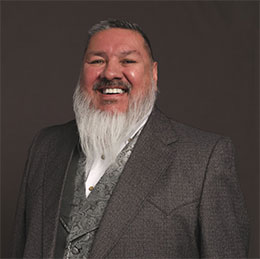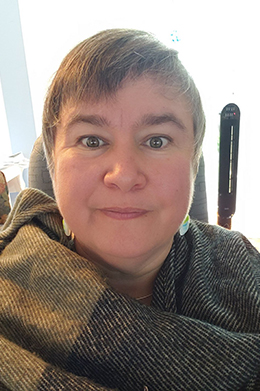Indigenous executive mentorship

Learn more about the Indigenous mentors for the Advanced Policy Analyst Program–Indigenous (APAP–I).
On this page
Meet the mentors
One of the unique aspects of the APAP–I is that you will be matched with an Indigenous mentor who is already working in the federal public service.
The mentors have a variety of experiences and come from different backgrounds. Some have worked in central agencies and in Indigenous organizations or governments, while others have dedicated their entire career to one or two departments.
All mentors are currently members of the Government of Canada's Indigenous Executive Network and are committed to supporting your successful transition to the federal public service.
- Frankie Berland, Regional Director, Indigenous Services Canada
- Mélanie Barrieau, Senior Director, Crown-Indigenous Relations and Northern Affairs Canada
- Danielle White, Assistant Deputy Minister, Indigenous Services Canada
- Patrick Boucher, Senior Assistant Deputy Minister, Public Safety Canada
- Isa Gros-Louis, Director General, Indigenous Services Canada
- Mary-Luisa Kapelus, Senior Assistant Deputy Minister, Crown-Indigenous Relations and Northern Affairs Canada
Mentor leadership stories
Frankie Berland, Regional Director, Indigenous Services Canada

Frankie is a Métis Executive who speaks fluently in both English and Cree. Frankie is originally from the Métis community of Big Bay which is about 20 minutes east of Lac La Biche, Alberta (northeastern Alberta). Frankie worked in Ottawa for 21 plus years with the Métis National Council (MNC), the Office of the Correctional Investigator, Correctional Services Canada, Indigenous Services Canada (ISC), Crown Indigenous Relations and Northern Affairs Canada (CIRNAC), and then back with ISC's First Nations and Inuit Health Branch (FNIHB), Alberta Region. Frankie has worked almost 19 years in the federal public service and almost 3 of these years with FNIHB in Edmonton. Frankie has significant experiences working in regional and national roles and responsibilities.
Frankie is the Regional Director of Policy Planning and Transformation in FNIHB responsible for:
- Jordan's Principle
- Health Facilities (Capital)
- Strategic Health Intelligence and Partnerships (Policy, Planning, Transformation)
- Regional Support Unit (Contracting and Procurement, HR Support)
- E-Health
- Space Force – Workplace Modernization in the Federal Public Service
Frankie possesses significant knowledge, experiences and subject matter expertise in engaging, consulting and maintaining working relationships with Indigenous and non-Indigenous people, communities, organizations, in particular developing:
- policies
- programs
- services
- governance capacity building
- working relationship agreements with Indigenous governments
Frankie is experienced working in an intergovernmental affairs capacity, whether it's with provinces, territories and national Indigenous organizations or working with other federal departments, sectors and regions. Frankie has managed projects, programs, services or initiatives and has a keen interest in making sure policies, regulations and legislation have a positive impact on those people they are intended to serve. Frankie takes great pride in ongoing learning, development and growing personally and professionally while contributing to learning opportunities for others.
Frankie is humbled by those who have taken the time to share their experiences and teachings with him, which has contributed to where he is at personally, professionally. As such, he feels obligated to pass on what has been passed on to him! Lastly but not least, Frankie describes himself as a "people person" with a commitment to fostering an opportunity for empowerment!
Mélanie Barrieau, Senior Director, Crown-Indigenous Relations and Northern Affairs Canada

Hi, I'm Mélanie Barrieau. I'm of Mi'kmaq ancestry from New Brunswick. I've been a federal public servant since 2008, but I've had the honour of working with First Nations, Inuit and Métis for over 30 years: first as an evaluation and performance measurement consultant (for 13 years), then at the Assembly of First Nations in social development (for 3 years) and lastly, as a public servant. This includes working at Government Consulting Services within Public Works and Government Services Canada, a decade in education at Indigenous Services Canada, a 1-year assignment at Service Canada, and now as Senior Director with the Missing and Murdered Indigenous Women and Girls Secretariat at Crown–Indigenous Relations and Northern Affairs Canada.
What I bring to my work is the knowledge and understanding I have gained from working with First Nations, Inuit and Métis community members, leadership, Elders and organizations, with a keen focus on education, health and wellness, social development, persons with disabilities and housing. I take a collaborative approach when working with partners and I strive to support my team, both in their work and in their career progression.
I'm a mother of 3 grown children and a grandmother to 1 child. I also have a master's degree in business administration, and I work from the heart and with passion, based on facts and sound management practices. I'm also fluent in both English and French and am happy to work in either.
Danielle White, Assistant Deputy Minister, Indigenous Services Canada
Advanced Policy Analyst Program–Indigenous (APAP–I) | Mentor Danielle White
Transcript of video: Advanced Policy Analyst Program–Indigenous (APAP–I) | Mentor Danielle White
Kwe' Kwe'
My name is Danielle White. I'm of Mi'kmaq and European ancestry and I'm a member of the Qalipu First Nation.
What inspired you to join the public service?
I've always been interested in how to change, how to make change from within and work within existing structures to make change. And so I was a student of political science and of history and public administration. And so that's initially what led me to a career in government and seeing, not just you know, understanding the legacy of the negative impact government has had on the lives of Indigenous people, but also seeing the opportunities to make some positive changes.
Patrick Boucher, Senior Assistant Deputy Minister, Public Safety Canada
Advanced Policy Analyst Program–Indigenous (APAP–I) | Mentor Patrick Boucher
Transcript of video: Advanced Policy Analyst Program–Indigenous (APAP–I) | Mentor Patrick Boucher
Hi, I'm Pat Boucher I'm Métis from Northern Ontario.
How does your cultural heritage influence your work?
I think what it does, as an Indigenous employee in the federal public service, we bring a different perspective to the table and as they say perspective is everything.
So whether we're working on supporting the government in advancing Indigenous files, or not, it really allows us to bring that different perspective to the table, just knowing the realities of communities, understanding how to engage with Indigenous communities I think has been an asset that I bring to the table and I think an asset, at the end of the day, for the public service as well.
Isa Gros-Louis, Director General, Indigenous Services Canada
Advanced Policy Analyst Program–Indigenous (APAP–I) | Mentor Isa Gros-Louis
Transcript of video: Advanced Policy Analyst Program–Indigenous (APAP–I) | Mentor Isa Gros-Louis
Hi, my name is Isa Gros-Louis. I'm a Huron-Wendat from Wendake, Québec, and I've been in the public service for 25 years.
How does your cultural heritage influence your work?
So, in the beginning, I must be honest with you, I thought it would be causing me a few conflicting situations because I didn't know if my values would be aligned with the department's, or the government at large, priority and directions. But I found, over time, that it was actually an asset. That my perspective, my experience and my values added to the work that I did. And they were taken into consideration and contributed to the development of programs and policies so that they became more real.
Mary-Luisa Kapelus, Senior Assistant Deputy Minister, Crown-Indigenous Relations and Northern Affairs Canada
Advanced Policy Analyst Program–Indigenous (APAP–I) | Mentor Mary-Luisa Kapelus
Transcript of video: Advanced Policy Analyst Program–Indigenous (APAP–I) | Mentor Mary-Luisa Kapelus
My name is Mary Kapelus.
What advice would you give to an Indigenous person starting their career?
I think first of all, the opportunities are endless in the federal public service, so whether you're serving on behalf of Indigenous people or cyber security or fisheries. The opportunities are endless and I think as Indigenous people coming in, we have such an amazing chance to influence policy in so many areas. This is Canada, Aboriginal people were the original occupants of the land and I think our journey in this country and our ability to influence policies and programming that touch all Canadians is an amazing chance for folks to try anything.